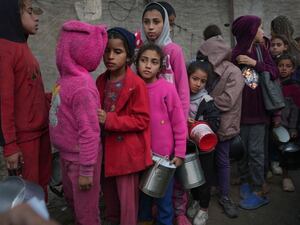Afghanistan’s Taliban leaders order women to wear burka in public
The move evokes previous restrictions imposed on women during the Taliban’s previous hard-line rule between 1996 and 2001.

Afghanistan’s Taliban leadership has ordered all Afghan women to wear the all-covering burka in public, officials said.
The move evokes similar restrictions imposed on women during the Taliban’s previous hard-line rule between 1996 and 2001.
“We want our sisters to live with dignity and safety,” said Khalid Hanafi, acting minister for the Taliban’s ministry of vice and virtue.
The Taliban previously decided against reopening schools to girls above grade six (around 11 years old), reneging on an earlier promise and opting to appease their hard-line base at the expense of further alienating the international community.

The international community has urged Taliban leaders to reopen schools.
Shir Mohammad, an official from the vice and virtue ministry, said: “For all dignified Afghan women wearing Hajib is necessary and the best Hajib is chadori (the head-to-toe burka) which is part of our tradition and is respectful.
“Those women who are not too old or young must cover their face, except the eyes.”
The decree added that if women have no important work to be done outside, it is better for them to stay at home.

Heather Barr , senior Afghanistan researcher at Human Rights Watch, urged the international community to put co-ordinated pressure on the Taliban.
“(It is) far past time for a serious and strategic response to the Taliban’s escalating assault on women’s rights,” she wrote on Twitter.
The Taliban were ousted in 2001 by a US-led coalition for harbouring al Qaida leader Osama bin Laden, but returned to power after America’s chaotic departure last year.
Since taking power last August, the Taliban leadership has squabbled internally as it struggles to transition from a war footing to government. This unrest has pitted hard-liners against the more pragmatic among them.
Infuriating many Afghans is the knowledge that many of the Taliban of the younger generation, like Sirajuddin Haqqani, are educating their girls in Pakistan, while in Afghanistan women and girls have been targeted by their repressive edicts since taking power.
Universities opened earlier this year in much of the country, but since taking power the Taliban edicts have been erratic.
While a handful of provinces continued to provide education for all, most provinces closed educational institutions for girls and women.
The religiously-driven Taliban administration fears that going forward with enrolling girls beyond the the sixth grade could alienate their rural base.
In the capital of Kabul, private schools and universities have operated uninterrupted.





